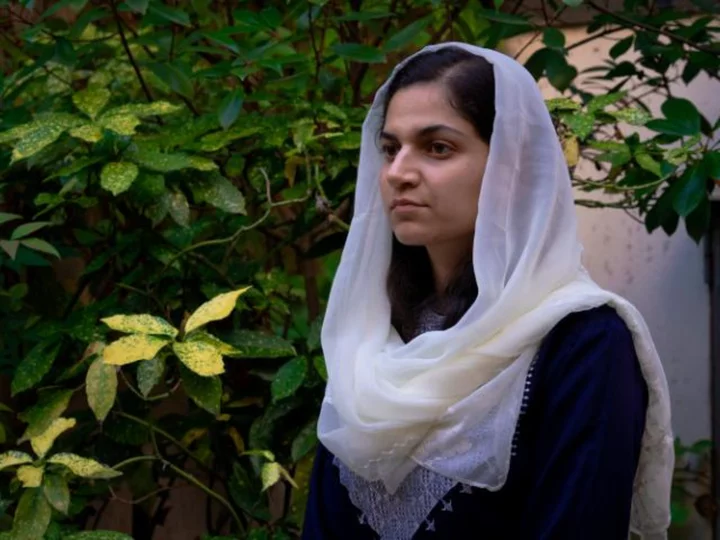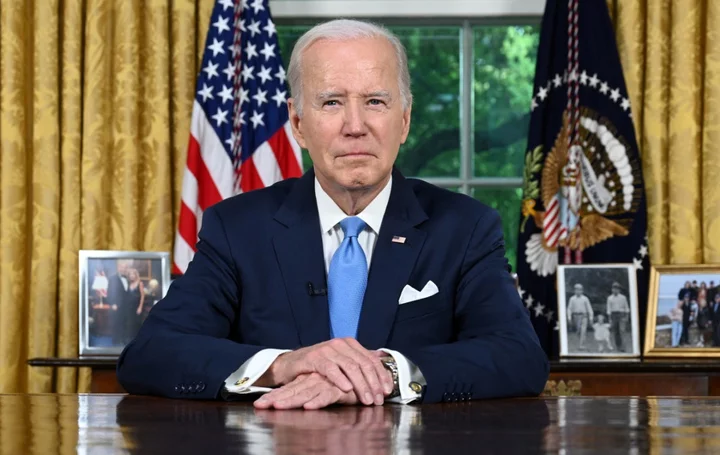Parasto Hakim was startled by a knock at the front gates.
She scanned her classroom for a quick headcount -- all the girls were already in attendance. It could only be the Taliban.
Her heart pounding, she opened the door to find at least five members of the Afghan militant group demanding to check if she was breaking any rules. She was. This was a secret school, set up to teach girls despite the bans on female education imposed by the Taliban since they retook control of Afghanistan two years ago.
Hakim immediately employed the school's security protocols. In order to ensure her staff and students' safety, she had instructed them on how to respond to a Taliban inspection.
"I told the girls to 'stay silent, keep your eyes down and don't talk' even if the Taliban speak to you directly," Hakim said from an undisclosed location outside Afghanistan.
"So when they (the Taliban) were asking them questions, the girls were just looking at me and I had to reply -- I was so scared."
Hakim says the Taliban tried to bribe the girls into talking, but they remained silent. The militants then started shouting at her and tried intimidating her and another teacher with their questions, she said. But after getting nowhere, they left.
Hakim operates SRAK, a clandestine network of schools, which educates around 400 girls across eight Afghan provinces with the help of 150 brave teachers and staff. CNN is not using the 25-year-old's real name, or the names of the female teachers and students we interviewed for this story to protect their safety.
CNN was granted access to film inside one of SRAK'S underground classrooms on the condition the location of the school and the identity of the students and staff remain hidden for their safety.
Broken promises
In the summer of 2021, Hakim watched in horror as the Taliban's tanks rolled into Kabul amid the United States' chaotic final withdrawal from the country. This time the group vowed a more progressive government than its previous fundamentalist rule between 1996 and 2001.
At a news conference held shortly after the takeover, senior Taliban leadership insisted women and girls would be protected from violence and that education would remain a right for all. Hakim did not believe a word of it, she says.
"They said the exact same words as before, saying they will make (Afghanistan) an environment according to the Sharia law and Islamic values, that they would have girls back at school and women would be able to work and attend university," Hakim said.
"I thought to myself, they are lying, they won't change, and they will never ever allow girls to go to school again."
The Taliban's promises were soon broken. Girls are not allowed to go to school beyond the 6th grade and are barred from attending university.
Women are being erased from Afghan public life by the all-male government. Last December, all local and international non-governmental organizations (NGOs), including the United Nations, were ordered to stop their female employees from coming to work. This year the Taliban closed all beauty salons across the country, an industry that had employed roughly 60,000 women.
The UN described the Taliban's draconian restrictions as "discriminatory and misogynistic" in a report published in June this year and said their rule could amount to "gender apartheid" and a "crime against humanity."
CNN has asked the Taliban for comment about why girls and women are barred from accessing educational opportunities but has not received a response.
Hakim says she came to the conclusion that continuing to provide girls with an education was the only way to fight back against the Taliban. In the face of history repeating itself, she turned to the example set by Afghan women who defied the odds more than 25 years ago, the last time the Taliban seized control.
"I was asking myself, what was the young generation doing in 1996 when the Taliban were in power? How were they living?" she said.
'I wanted to scream, but I couldn't'
Inspired, in part, by a 1996 Christiane Amanpour documentary titled "Battle for Afghanistan," Hakim decided to create secret schools for a new generation of Afghan girls.
That night, Hakim says she made a series of frantic calls to her contacts, asking for help. Among them was her old friend, Maryam.
"We have to start at least something for girls to gather together and have their own indoor community, in underground spaces to learn and be educated," Hakim recalled telling Maryam. "I have all the resources you need; I just need you (Maryam) to expand it," she continued.
"I was working so I could afford to buy books, notepads and everything we need for underground classes."
Maryam, a trained educator, said that when she heard from Hakim, she was eager to help and wanted to break free of the Taliban's restrictions.
After the militant group imposed the bans on girls' education, Maryam says she was trapped at home and felt like a "zombie," with nothing to do and nowhere to go. The situation led to her suffering from severe anxiety and depression, she said.
"I was in a situation where I wanted to scream, but I couldn't, it was some of the worst days of my life," she said.
Maryam says as word of the school got around, more students began to enroll, and she found girls were relieved to attend to escape the pressure of being at home.
"Some girls refuse to stay home on government holidays, even if there's no teacher at the school, they ask me to let them come in," Maryam said.
"That shows how desperate they are to escape the stress of sitting at home and thinking about how they are deprived of their rights."
On the day CNN visited Maryam's hidden classroom, about 30 girls were huddled into a tiny room to learn everything from English to math to science and tailoring.
"The school is like a light for me, it's like a road where I can see happiness and sunrise at the end of it," Maryam said.
"It gives me hope that one day regular schools will reopen, and every girl will be free to go back to school and women will be able to go back to their jobs."
Such hope is sorely needed in Afghanistan. Rates of anxiety, depression and suicide among women are on the rise in Afghanistan since the group's return to power, according to the UN.
'It felt like being a prisoner'
One of Maryam's students, 16-year-old Fatima, was among the many girls and women feeling depressed and anxious while confined to their homes by the Taliban's prohibitions, their future opportunities tragically curtailed.
"I thought I was being thrown out of society," Fatima recalled. "It felt like being a prisoner, like a prisoner who is only allowed to eat and drink, but not allowed to do anything else."
"By sitting uneducated at home, we can't achieve anything," she continued. "I didn't want to be a burden on my family and society, and by getting an education, I want to fulfill my dreams."
With the support of her family, she discovered the underground classes taught by Maryam and others and found her passion. She loves tailoring and dreams of becoming a famous fashion designer.
"I want to be a woman who is well known amongst people," she said. "I don't want to be behind a mask forever, I want to be able to show my real face."
For Yalda, another student, resuming her education proved to be a lifeline. She had nearly given up on her goal of becoming an engineer.
"It was an escape from the anxiety and depression I felt sitting at home," the 14-year-old said about going back to school, even in this limited way.
Yalda, Fatima, Maryam and countless others are dreaming of a future without the Taliban and preparing for the day they can step out of the darkness.
"Even if the Taliban stay seven or eight more years, they will eventually go and then we can go to university and continue our education," Yalda said.
'Half a human being'
Fawzia Koofi, a women's rights activist and pioneering Afghan lawmaker under the previous internationally backed administration, remembers living through a similar regime change when the Taliban first came to power.
Speaking from exile, Koofi says women then faced the same restrictions on movement and education that they face today. And back in 1997, she -- just like Hakim -- started a secret school, but with a few differences.
"It was always a small number of girls, maybe six or seven, I only taught them English and science, not to arouse suspicion (from the Taliban)," Koofi said. "We still had to be very careful and take precautions to prevent them from detecting us."
Koofi had been accepted into medical school but was confined to her home when the Taliban took power in 1996.
"When you're outside, the Taliban would look at you as if you are half a human being; telling you to cover your face," she said. "It was never about what you can contribute to society or how talented you are, it was only about what you wore."
During her subsequent political career, Koofi made history in 2005 by becoming the first woman elected to Afghanistan's parliament and then the country's first female deputy speaker.
After the Taliban returned in 2021, she fled the country, hoping one day to return.
Hope stronger than fear
Back at the secret school, Maryam learns the Taliban are checking neighborhoods for illegal activities and fears they risk being caught. She still feels gut-wrenching nerves at the prospect of a visit from the militants.
"I am scared, I experience fear at every moment," she said. "But at the same time, I move on with the hope that tomorrow will be better than today."
"There is a power stronger than fear, that is our hope for the future."
The future is something Fatima also keeps in mind while making her journey to school every morning.
She says she worries that she could be arrested by the Taliban but, to her, it's worth the risk.
"If they detain me, I will tell them I just want to be educated," Fatima said. "I don't want to sit at home and that is not a crime."









